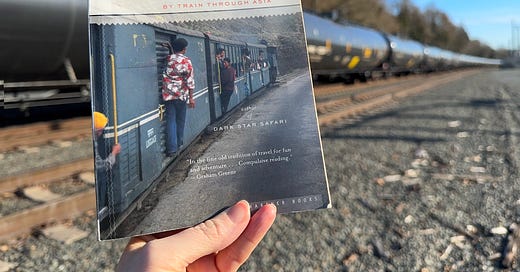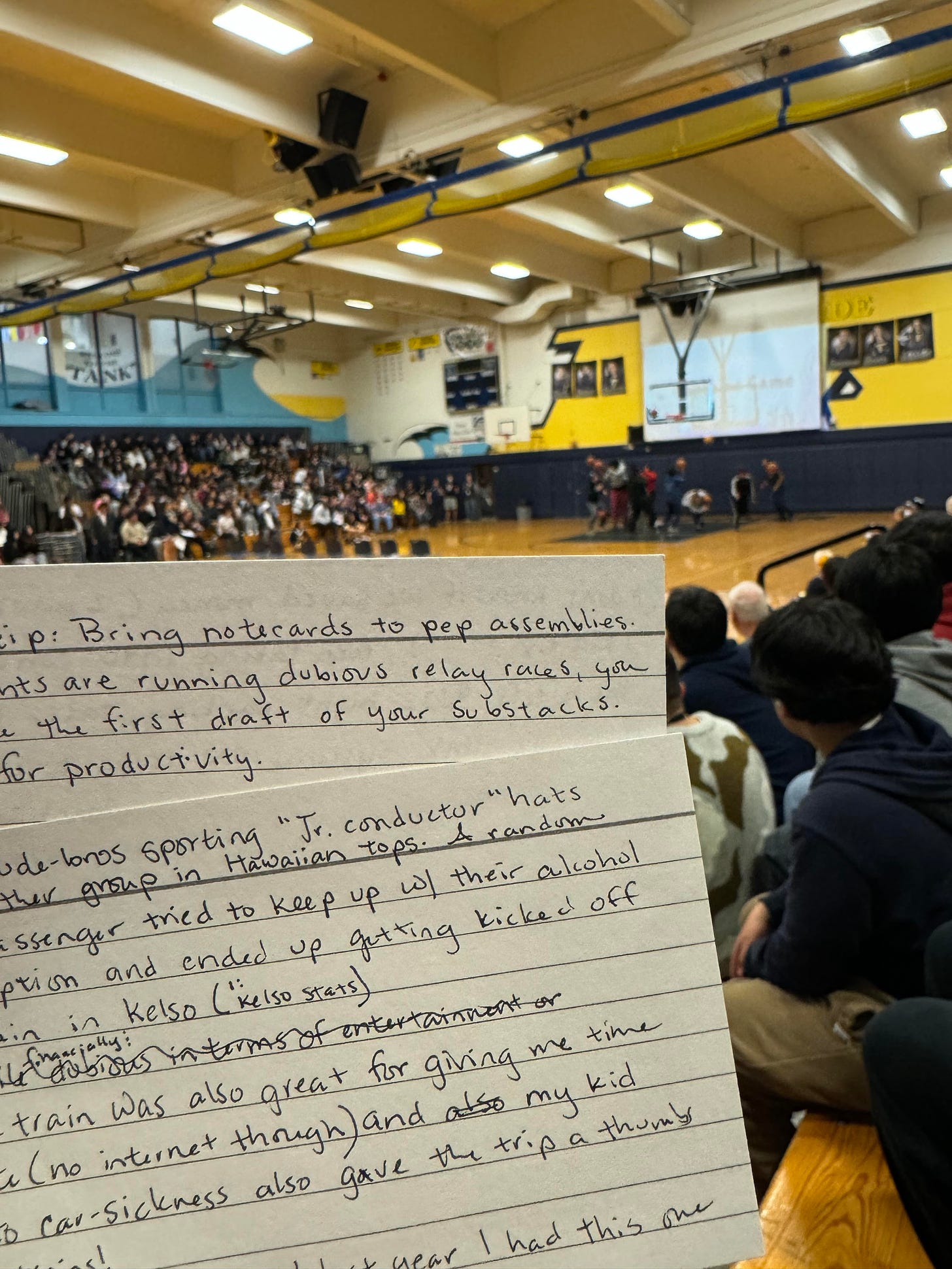Trains
"Ever since childhood, when I lived within earshot of the Boston and Maine, I have seldom heard a train go by and not wished I was on it." --Paul Theroux
First, a random teacher productivity tip: Bring notecards to pep assemblies. While students are running dubious relay races involving basketballs, pop songs, and musical chairs, you can write the first draft of your newsletter. Yay for productivity.
A place to explore: The Amtrak Cascades line to Portland
My family did something very un-Pacific-Northwest-y. We rode a train.
My kid had a cheer competition in Oregon, so we took a 5+ hour train to Portland instead of making the 4+ hour drive. (Driving is typically the way to go in the PNW, as public transportation can be nonexistent in places. However, the Portland MAX Light Rail served our purposes for this trip.) Amtrak tickets for the 4 of us were just over $250. Even taking gas and the hotel’s $ 20-a-night parking rate into account, we didn’t save money. I guess that’s another reason why few people take the train.
It’s a beautiful trip though. North of Seattle, the train hugs the Salish Sea. Sightings include Whidbey Island, pieces of the Olympic Peninsula, and rocky beaches. On the East side of the train, riders get increasingly larger views of Mt Rainier and then Mt. St. Helens, as the Cowlitz River unspools before joining up with the Columbia.
The train passengers were also entertaining. There were two bachelor parties en route. Jovial dude-bros sporting Junior Conductor paper hats patrolled the dining car and a random train passenger tried her best to keep up with their alcohol consumption. She went from car to car, making unsolicited best friends in each car, giving them very loud and serious life advice. She ended up getting kicked off the train in Kelso1.
On the way home a very self-assured man lectured the person next to him (and, due to his loud voice, the entire car), about the vices of electric cars. Stating his opinions as if they were facts, he pontificated about how it was impossible to travel the American West by electric car.2 The lady across from me caught my eye after a particularly galling statement and we both rolled our eyes and started laughing. Is there anything better than having a laugh with a stranger?
A book to read: The Great Railway Bazaar by Paul Theroux
Like my little blurb above, Theroux’s book is also more about train passengers than actual trains.
I first read THE GREAT RAILWAY BAZAAR back in 2010 when I was working on being a travel writer. In the end (“the end” being 2012), I became a single mom instead of a travel writer. I had a good run though, because I got to read Theroux. Also, some vestiges of that career are still around. I just had a travel piece about Tulsa published in Western Art and Architecture, and one can always write about Disneyland (here’s my take) and traveling with kids.
THE GREAT RAILWAY BAZAAR is Theroux’s journey across Europe and Asia as he “board[ed] every train that chugged into view from Victoria Station in London to Tokyo Central.”3
He wrote the book in 1975, a time when there was still worry about cholera in Italy, and Tehran is described as having “all the qualities of that oil-rich Texas city [Dallas],” complete with chic women who “skitter around holding other women’s hands.” Yugoslavia existed.
There’s not really a narrative thread to this book, but Theroux is such a master at describing people and places, one can read this book for the descriptions alone and be perfectly happy. Some examples:
“A granny, wearing a shawl that hid everything but her enormous nose…”
“A Buddhist monk went by, smiling broadly. He was a fat man and he carried his umbrella like fasces, a Roman senator in an orange toga.”
So delightful.
A lesson to teach: Trains in colonial Africa
Last year I had a student obsessed with trains. This year, he sent me the following YouTube clip4 along with a note: “It’s me!”
Therefore, I tried to incorporate train-themed lessons in each unit. Without fail, my train-obsessed student would always be out sick on train days. Sigh. Here is one such lesson. It’s pretty straightforward, so makes for a good sub-plan as well.
When studying the European colonialism of Africa, I start train day with this video:
The video incorporates gorgeous African shots with all the train vibes to excite those railroad-obsessed kiddos. The narrator speaks a bit about colonialism and students get to learn a bit about how and why some of the train lines were created. The video also provides tons of photos showing modern African cities, natural wonders, and glamorous beach towns - a far cry from the savannahs and poverty that still dominate Western media coverage of Africa.
I typically show the video as an engaging warm-up to the reading, but if you want to give kids some questions to answer along with the video, here ya go.
Then we dig into this article about how and why colonizers built railroads in Africa and how those railroads are impacting African countries now, almost 100 years after independence. Kenya and Ghana are showcased as examples.
The article isn’t easy to read, so I pulled out four paragraphs and two map sets for students to analyze. Here is the worksheet with the maps, reading excerpts, and student questions.
As always, contact me with questions! I love to talk curriculum and would like to know if any links aren’t working.
Population: 13,000
An opinion my parents would vehemently disagree with. They traveled from Seattle to Madison, WI on a multi-week road trip in their electric car last year. Things apparently got a little dicey in North Dakota, but they made it through.
Warning: This was not an especially great idea for a dude with a small family, as it led to his divorce.
The train bit starts at 7:55





I LOVE TRAINS! *ahem* I really like trains and always prefer taking them. I'm one of the weirdos that can sit backwards on moving trains, and love to do so. I find it much more relaxing than cars. And as a writer, when you're around that many people, something weird is bound to happen or inspiration is bound to strike.
I love trains. It’s a great way to travel. Writing time, scenery, avoiding freeways. Thank you, Jenna.